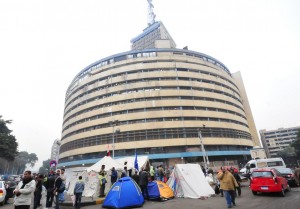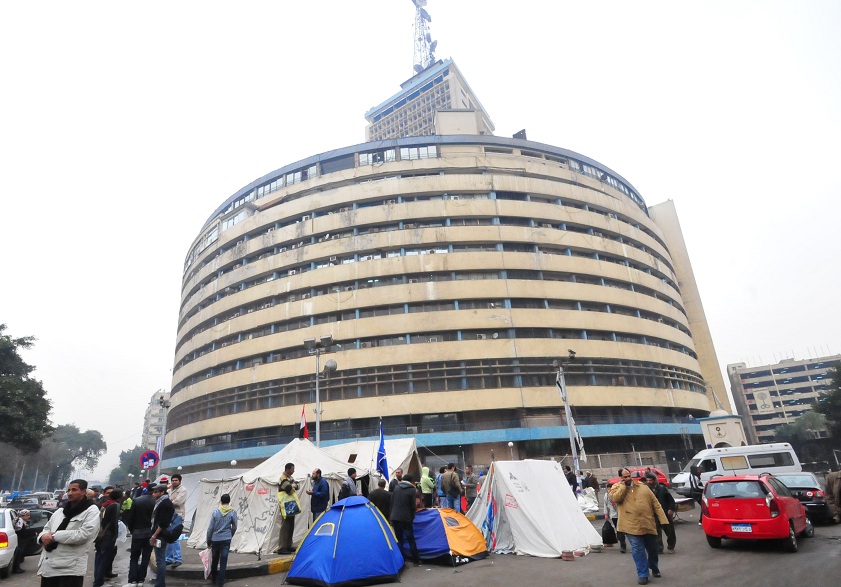The level of freedom of the media in Egypt was brought to headlines locally and internationally in December, when an annual roundup of violations against journalists across the world showed that Egypt is the second country in the world for the number of journalists arrested, and fourth “biggest prison” for journalists in 2014, according to Reporters Without Borders.
Media Consultant Shaimaa Aboul Kheir said this environment of “terrorising and intimidation” is affecting journalists to a great extent, and it is affecting the quality of their work. She said this climate is creating pressures on journalists and affecting their safety.
However, Taghrid Al-Desouki, the producer of a morning show that is aired on state run-television said: “In my work, I personally do not get instructions telling me what to say.” She believes that state television is, to a great extent, more independent than private news services.
Al-Desouki said media has become more independent after the revolution, but described the period under the rule of ousted president and Muslim Brotherhood politician Mohamed Morsi as the “worst period for television”. She said under the Brotherhood, “anyone could get investigated”, and added that there were instructions on which guests should be brought on the show.
Meanwhile, Khaled ElBalshy, a board member of the Press Syndicate, does not believe that the media has become more independent after the revolution.

(DNE File Photo)
“The [media] system is not free,” he said, and this applies to the era of ousted president Mubarak, the interim rule of the Supreme Council of the Armed Forces, the Brotherhood’s rule, the transition phase under interim president Adly Masnour and until now.
ElBalshy believes that this system has not changed throughout all these power changes, and it “needs to be liberated from all forms of state authorities”. This is what needs to happen in the upcoming period, he added.
ElBalshy believes that part of the problem is related to media ownership. “The media is either owned by the government or by businessmen who are approved [by the authorities],” he said. In a sense, ElBalshy believes that this means that the private media services are owned “by representatives of the government”.
“All the authorities have maintained the system,” he said.
ElBalshy believes that despite this system, the freedom to express and criticise is being exercised “whenever a journalist manages to go outside of this pattern”. The freedom is dependent on the abilities of parties to “grab this freedom”. Therefore, the level of freedom varies within this system “based on the will of individuals”.
In addition to the will of individuals, it is also dependent on the authorities’ tightening and loosening of its grip on the media.
This means that if the authorities loosen their grip, journalists’ voices become louder, he said. If the people are conscious, which happened after the 25 January Revolution, there is more media freedom, he said.
Meanwhile, he added, if they are scared of certain groups returning to power, there are restrictions on media freedom, which is what happened after the July power shift, in which the Brotherhood were ousted.
Aboul Kheir said violations that journalists are subjected to do not just come from the authorities. “There are many directions from which violations come from,” she said. Violations may come from political forces and from citizens, many of whom are violent towards journalists.
“The group most likely to be subjected to violations are journalists and photojournalists”, Aboul Kheir said.
Reporters Without Borders’ (RWB) annual roundup said that between December 2013 and December of last year, 46 journalists were arrested in Egypt. It added that 16 journalists are imprisoned in Egypt, representing 9% of all professional journalists imprisoned worldwide. “The political situation does not justify President [Abel Fattah Al-]Sisi’s repressive policies and the propaganda regime he has established,” the media watchdog said.
In Reporters Without Borders’ 2014 World Press Freedom Index, Egypt ranked 159th out of 180 listed countries.
The indicators were also not optimistic in 2013, during which Egypt ranked among the top ten jailers of journalists in the world, according to press freedom watchdog the Committee to Protect Journalists census of imprisoned journalists. The committee also ranked the country as the third deadliest country for the press in 2013.
Aboul Kheir believes there are pressures exercised by authorities on journalists, but what is worse is the self-censorship that journalists are exercising.
“They are not waiting for instructions in order to publish content that supports the state and its policies,” she said, adding that many journalists have volunteered to do so. She said that this includes journalists from all ages, whether younger journalists or veterans.
She believes that the reason behind this is because these journalists believe that if they carry out their work independently, they will be putting themselves at risk, especially under the issues facing justice in Egypt.
An example she gave is that of freelance photojournalist Mahmoud Abou Zied, also known as Shawkan, who has been imprisoned for over 500 days. She said that all legal procedures and appeals asking for his release have been exhausted, and none of it has worked, even though there is consensus that Shawkan is a professional journalist.
In an open letter describing his detention as an endless nightmare, Shawkan said: “Journalists are being killed, kidnapped, detained, beaten, arrested, threatened and tortured.”
Shawkan was arrested on 14 August, 2013 while covering the forced dispersal of the protest camp set up in Rabaa Al-Adaweya in support of Morsi. Several journalists were arrested that day, including then-correspondent for Al Jazeera Arabic Abdallah Elshamy. Elshamy was eventually released after 306 days in prison without charge, and 147 days on hunger strike.
According to international watchdog Human Rights Watch, the death toll from the dispersal amounted to likely more than 1,000 people. At least four journalists were killed on that day.


